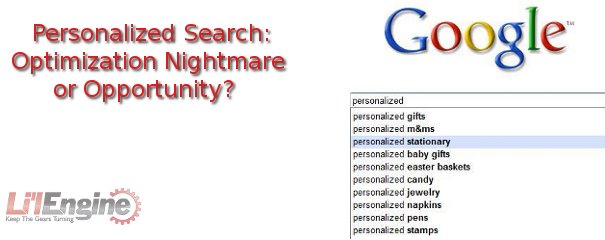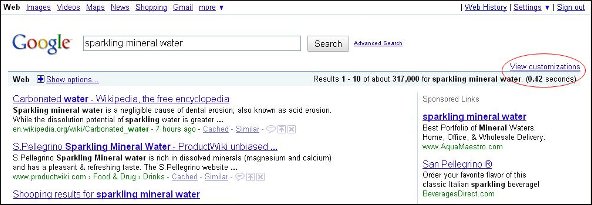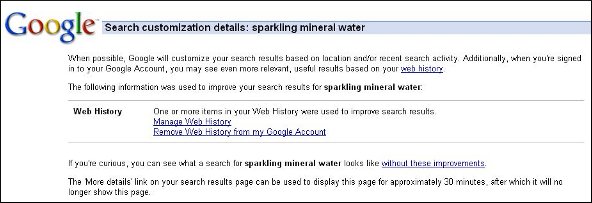Google Personalized Search – Optimization Nightmare or Opportunity

In December 2009 Google rolled out Personalized Search for users who were not signed in, and in over 40 languages. Personalized search has been around for awhile for signed in users who have web history enabled. This allows Google to fine-tune your search results based on past searches and on the sites you’ve clicked on in the past. This is how Google tries to optimize searches for you when your search terms have more than one meaning.
For example, Googling the term “blackberry” while signed in with web history on gets the results you see on the first screen shot. From my search history it is clear that I’m much more likely to be searching for information about the BlackBerry PDA than about the actual fruit. On the other hand, my mom, who does a lot of baking and jam-making, would probably end up with search results about the fruit rather than about the electronic device, based on her history of looking up recipes.

So now that personalized search is on offer for signed out users, exactly what does that mean?
It means that personalized search can use an anonymous cookie on your browser to base your search results on 180 days of search activity linked to this cookie. This is completely separate and apart from your Web History and your Google account. When you have the option of personalized results while signed out, you will see a link that says View Customizations in the top right corner of the results page, as you can see in the second screen shot. When you click on it, you can see how the results are customized and, if you want, you can turn off this type of customization, as you can see in the third screen shot.


Now, there are obviously computers where lots of different people search, so the browser cookie might be influenced by multiple people’s search activity. To protect the privacy of the non-signed-in users, you can’t actually view the specific search activity upon which the signed-out personalized search is based. Plus, you can turn off personalized search settings for signed-out personalized search altogether if you want.
As for signed-in personalized search, you can clear the history upon which your personalized results are based at any time to protect your privacy. That way, if you stay signed in and someone else wants to know what you’ve been searching on, they won’t be able to do it through your personalized search history. Of course they could still go through your web history, so if you’re concerned, you should use your browser to clear your web history.
If you’re a webmaster, you might be wondering whether personalized search, adopted on a massive scale, will affect your ability to reach the people you want to visit your website. The answer, unsatisfactory as it may be, is “Yes, and no.”
Consider this. If a user searches for, say, “pith helmets,” and visits the top result and the last two results on the first page of listings. Then those three websites will be added into the person’s personalized search data. Next time the user decides to do a search for “pith helmets” then those two sites from the bottom of the first page of results will rank higher than they would in an organic, starting from scratch search.
But what if the user finds another search result, say the 7th one on the new results page, and bookmarks it and goes there henceforth rather than searching for pith helmets anymore for the time being. But then, a few months later, he thinks that maybe there’s a better pith helmet out there so he does another search. But this time, the one he bookmarked shows up as the top result. What gives?
Even though that site didn’t do any special SEO, there it is, right at the top of our pith helmet-loving searcher. However, other searchers will find other pith helmet dealers at the top of their results pages.
So how do you, the webmaster, change your SEO strategy? Or do you need to change it? If you’re doing legitimate, white-hat ways of getting traffic to your site, then your site will be more likely to bubble to the top of the research results for personalized search. A first time searcher might find your site perched at No. 1 simply because he has already visited it a bunch of times through other routes. This is true even if your site wouldn’t be tops in an organic search.
There’s nothing really that you should change in terms of your SEO strategy. Keep doing the on-site SEO as you have been, and you’ll probably do fine. But there’s nothing wrong with using off-site SEO to build up your brand and keep your visitors happy. Again, it boils down to having great content that people will find compelling and that will make them want to come back. This helps you whether the game is organic search or personalized search.
The takeaway is this: Google personalized search isn’t so much revolutionary as evolutionary. It’s not going to take all the search engine results and shuffle them massively. It may mean that sites that focus on the mechanics of SEO without focusing on great content could lose some ranking, but even that seems unlikely. Personalized search will change things up a little on an individual basis, but it by no means throws out the concept of organic search results based on SEO.







